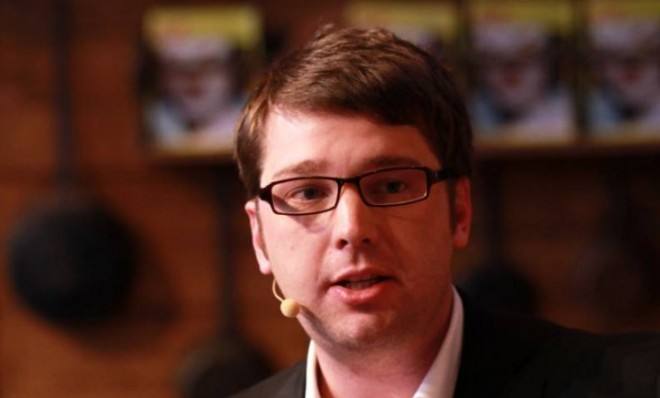Groupon fires CEO Andrew Mason: Can a new leader turn the company around?
The former darling of Silicon Valley has floundered since going public


A free daily email with the biggest news stories of the day – and the best features from TheWeek.com
You are now subscribed
Your newsletter sign-up was successful
I've decided that I'd like to spend more time with my family," Groupon CEO Andrew Mason told his employees on Thursday. "Just kidding — I was fired today." So begins a refreshingly honest resignation letter that caused a spike in Groupon's share price, which has stumbled badly since the online deal site went public in 2011. Mason's ouster was widely expected, given Groupon's rapid evolution from the next hot Internet company to a fraught symbol of how quickly fortunes can change in the tech industry. But can a new CEO turn things around?
First, a quick recap of Groupon's rise and fall: The site offers discount coupons on a variety of goods and services, taking a cut from each deal that's fulfilled. Companies were initially eager to offer discounts, with the hopes that they could tap into a new reservoir of customers. Groupon was one of the first companies of its kind when it landed on the scene in 2008, and soon swelled to a 10,000-employee operation with a presence in dozens of countries. At the height of its popularity in late 2011, the company was valued at some $13 billion on the stock market.
It is now worth about $3 billion. So what happened? The company was caught using some sketchy accounting tricks, which unnerved investors. But a string of quarterly losses has been attributed to deeper factors — raising doubts about whether anyone can make the company profitable.
The Week
Escape your echo chamber. Get the facts behind the news, plus analysis from multiple perspectives.

Sign up for The Week's Free Newsletters
From our morning news briefing to a weekly Good News Newsletter, get the best of The Week delivered directly to your inbox.
From our morning news briefing to a weekly Good News Newsletter, get the best of The Week delivered directly to your inbox.
Analysts say that ditching Mason is a step in the right direction. Mason has an iconoclastic streak that can be endearing, and his personality shines through in his resignation letter, which is normally a medium for the blandest corporate speak. "You are doing amazing things at Groupon, and you deserve the outside world to give you a second chance," he wrote. "I'm getting in the way of that. A fresh CEO earns you that chance." But his antics, which have garnered much attention, haven't gone over well with investors who would prefer a more sober hand at the wheel. With Mason's departure, Groupon has indicated that it "wants to leave Never Never Land," says David Benoit at The Wall Street Journal.
The company will be led in the interim by Executive Chairman Eric Lefkofsky and Vice Chairman Ted Leonsis, an AOL veteran. Lefkofsky, Leonsis, and Groupon's future CEO will face numerous challenges. As Megan McArdle writes at The Daily Beast:
The problem with Groupon isn't its management; it's the business model...
Coupons basically serve two purposes: advertising, and price discrimination. They either make people more willing to try a new service, or they let you sell to very price-conscious consumers while still charging your less frugal customers full price. Businesses were encouraged to view the coupons as advertising--to sell their products or services at very close to cost in order to attract new customers who would then come back once they'd discovered how awesome the firm was. But coupon buyers were pitched on the price discrimination side: for them, Groupon was about a constant flow of super-cheap deals, not a way to discover new businesses where they might become long-term customers. [The Daily Beast]
As a result, customers never became the return customers that businesses value so dearly, and businesses began to pull out of Groupon's scheme. Furthermore, Groupon's act was easy to imitate. According to the Associated Press:
Groupon had the advantage of being first, but the model is easy to replicate. It has spawned many copycats after its 2008 launch, from startups such as LivingSocial to established companies such as Google Inc. and Amazon.com Inc. [Associated Press]
And perhaps most disconcertingly, Groupon may be turning off potential customers with its aggressive marketing strategy (which also costs a ton). As Diane Brady at BloombergBusinessweek says:
A free daily email with the biggest news stories of the day – and the best features from TheWeek.com
There are only so many half-price Thai food offers one can stomach before Groupon e-mails start to look like spam. [BloombergBusinessweek]
Many analysts say that Groupon will have to make root-and-branch changes to its business model if it wants to succeed. According to Drew Fitzgerald at The Wall Street Journal:
"We have little confidence in Groupon's ability to attack 48 countries and 500 markets simultaneously and profitably," Jordan Rohan, an analyst for investment bank Stifel Nicolaus, wrote. "We remain intrigued by the potential of the daily deals business, but have no faith in the 'playbook,' as described to investors."
The company needs a complete makeover, Mr. Rohan said. [The Wall Street Journal]
Ryu Spaeth is deputy editor at TheWeek.com. Follow him on Twitter.
-
 Secured vs. unsecured loans: how do they differ and which is better?
Secured vs. unsecured loans: how do they differ and which is better?the explainer They are distinguished by the level of risk and the inclusion of collateral
-
 ‘States that set ambitious climate targets are already feeling the tension’
‘States that set ambitious climate targets are already feeling the tension’Instant Opinion Opinion, comment and editorials of the day
-
 Mixing up mixology: The year ahead in cocktail and bar trends
Mixing up mixology: The year ahead in cocktail and bar trendsthe week recommends It’s hojicha vs. matcha, plus a whole lot more